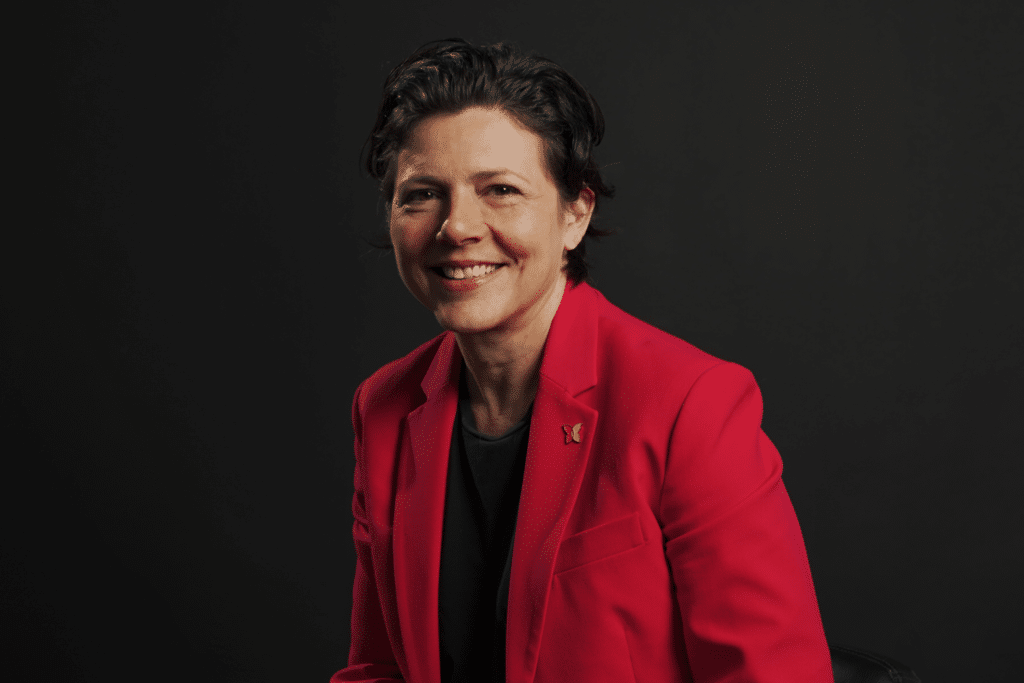Artificial Intelligence is a megatrends shaping our lives, according to the CSIRO and many other research groups.
Just one year since the launch of ChatGPT, OpenAI’s natural language processing chatbot, many of us have seen and experienced the potential of fast-emerging AI firsthand.
But what role could AI have in supporting our mental health?
Beyond Blue CEO Georgie Harman tackled the subject during a recent ‘Mini Keynote’ for our Keynotes series, part our video skills, ideas and learning app, The Keynotes.
Harman spoke about Beyond Blue’s mission to support people as they navigate through difficult times, always aiming to support people to feel better earlier, to get well and stay well. This includes for the rising number of people aged 15 to 24 who are now contacting the support services.
“Whether someone’s feeling more unsettled than usual or is turning to us in their darkest moment, we want them to trust that they’ll be met with compassion, knowledge, and pathways to support that suit their unique circumstances,” she said.
“Making the step to open up and say I need help is one of the most important steps a person can take to get on the road to recovery.
“And that’s why we need to make the process as easy and accessible as possible. Especially with so many online spaces and tools now at our disposal, making it difficult to know which information to support and trust, and where to access the right information safely.”
Beyond Blue offers live webchat options for people to contact counsellors, with Harman stressing people will also be connected with a real person.
But Harman said that AI advancements, as well as therapist-guided and self-guided techniques, are showing some good results in reducing depression and anxiety symptoms.
“This is not a debate about whether AI will be a phenomenon we need to engage with – it’s already here and evolving at warp speed.
“The question for those of us working in mental health is, can artificial minds help real ones?
“And what are the risks in letting them try?”
Harman noted the growing rates of distress and mental ill health facing Australia, especially following the pandemic, extreme weather events, natural disasters and cost of living pressures.
“Demand for support is growing and the existing workforce can’t keep up,” she said.
“There are widening gaps in inequity of access, and we’ve known for years that more than half of people with mental health conditions don’t access professional support.
“Many are delaying seeking help, or not reaching out at all, because of high costs or because options simply aren’t there.
People are facing long waitlists, are too often offered piecemeal, time-limited options, or struggle to access the right support.”
And, sadly, people are often very unwell before they get help.
“So many people would benefit from low intensity support when they first start to struggle before their symptoms deteriorate.”
With this backdrop in mind, Harman says it makes sense to consider whether AI could be part of the solution.
With AI in this context covering everything from large scale data analysis to sophisticated algorithms, chatbot questionnaires and advanced Large Language Models like ChatGPT, Harman noted that what distinguishes AI from more traditional internet-based mental health interventions is its ability to learn quickly, adapt and evolve.
She said the emerging research is promising, and indicates that AI has the potential to improve early detection of mental health conditions.
Indeed, the power to analyse large swathes of language and information could also enhance professional practice, enabling the analyse of counselling sessions to offer therapist insights on what’s working and whether improvements are being made. Data insights could also help people to better self-manage and monitor their own mental health too.
But despite the enticing potential for AI, Harman notes that we must always be cautious about examining options for people at vulnerable points in their lives.
“It’s hard to imagine AI fully replicating the benefits of human relationships. That deep sense of connection that comes from being truly seen and understood might not feel as profound or authentic when computer-generated,” she said.
“There is also an inherent risk of bias or discrimination. We’ve seen concerning examples of facial recognition programs not recognising people of colour.”
We don’t have enough robust evidence for the widespread application of AI interventions in mental health. And as the World Health Organisation and many others warn, this rapidly developing tech raises ethical, legal and social concerns. Questions also remain about AI’s clinical safety.
At the end of the day, a computer can’t empathise, and it doesn’t care.
“Digital mental health services are transforming the way people access supports and information, but we’re still in the early days,” says Harman.
Beyond Blue is currently strengthening its digital supports and making them easier to navigate. Harman said their priorities are to ensure accessible, personalised, safe and connected mental health support at the earliest stage possible.
“The opportunity for further investment and growth in digital mental health is enormous and we need to meet community expectations in the modern age,” she said.
“We owe it to those whose lives are impacted by mental ill health to explore every emerging solution, stacking AI’s potential risks against its benefits.
“With the right guardrails in place, we can harness technology to improve access, remove financial barriers and ensure every person gets the right support at the right time.”
You can learn more about our video skills, learning and ideas app The Keynotes, here.
If you need help, please reach out:
Beyond Blue: 1300 22 4636 or beyondblue.org.au
Kids Helpline: 1800 55 1800 or kidshelpline.com.au
Headspace: 1800 650 890 or headspace.org.au
Lifeline: 13 11 14 or lifeline.org.au


